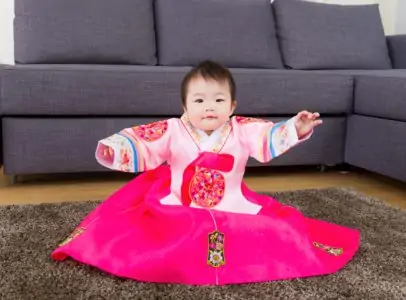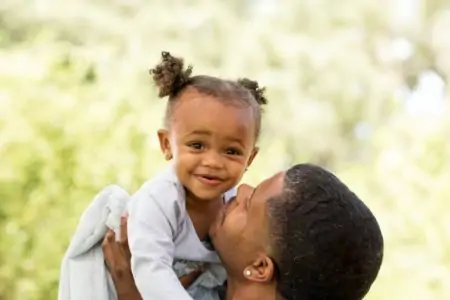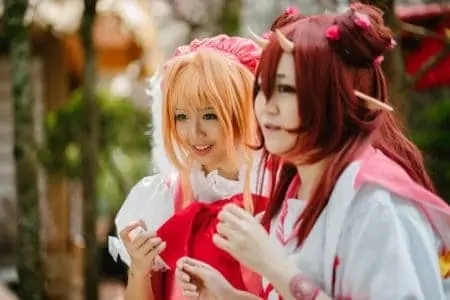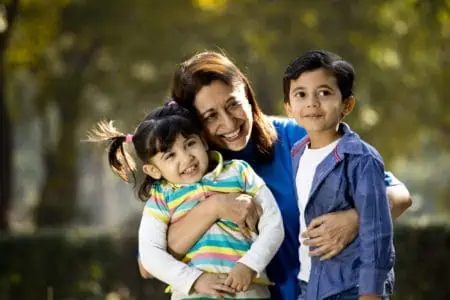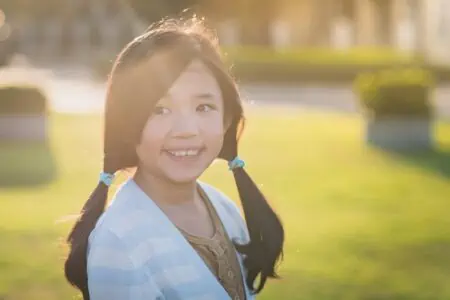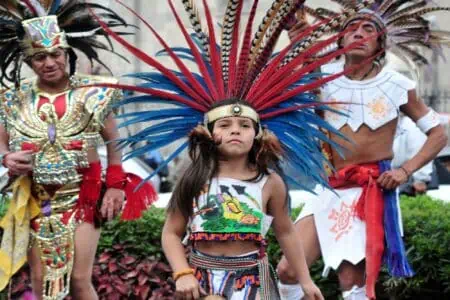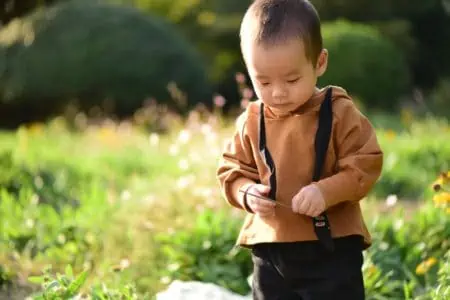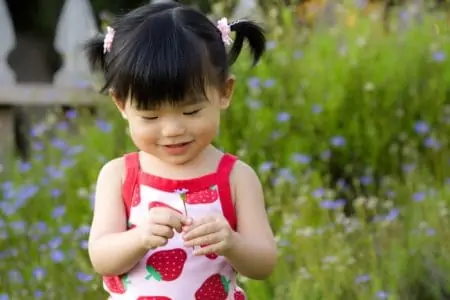If you’d love to give your baby girl a Korean name, but don’t know where to start, you’re in the right place. We’ve painstakingly researched female Korean names and their meanings, as well as facts about each name. This list will save you time that might be better spent with nursery preparations or getting some extra sleep.
Let’s check out some beautiful, magical, and unique Korean girls’ names you may want to choose for your little bundle of joy.
100 Korean Girl Names and Meanings
These Korean names for girls include popular, cool, and common choices.
1. Ae-Cha (애차)
Ae-Cha can mean loving daughter.
There are meaning variations — the hangul 애차 reads aecha, but means favorite car. This may or may not be an appropriate choice of names, depending on how much you like automobiles.
2. Ari (아리)
Ari comes from the first part of the adjective arittapda or 아리땁다, which means pretty, lovely, beautiful.
It can also be written with hanja that read A, such as 䢝, which means second, next, and 利, which reads ri and means benefit.
3. Balam (바람)
The gender-neutral Korean name Balam means wind.
It is one of the native Korean words which have been adopted as names. It is also an archaic Georgian name that means victory over resistance.
4. Binna (빛나)
Binna means to shine.
Korean curator Choi Binna is the director of the Casco Art Institute. Binna works for the Commons, a not-for-profit organization based in Utrecht, the fourth largest city in the Netherlands.
5. Bora (보라)
The Korean girl name Bora means purple.
Bora is also an Albanian girls’ name that means snow, a Slovene girls’ name meaning pine tree, and a Turkish boys’ name that means storm or squall.
6. Boram (보람)
Boram means valuable or worthwhile.
Giovanna Boram Yun Echevarría is a Uruguayan footballer who plays for Defensor Sporting and the Uruguayan national team. Echevarría’s mother is Uruguayan and her father is South Korean.
7. Chae-Won (채원)
Chae can mean gather, pluck, or color, while Won often means source, origin, beginning.
Chae-Won was the seventh most popular name given to baby girls in South Korea in 2013. Since there are 18 hanja that can read as Chae and 45 that read as won, it’s likely there is a wide range of meanings chosen for these little ones.
8. Chae-Yeong (채영)
Chae-Yeong means color combined with glory, honor, or jade.
As with other popular Korean girls’ names that make use of the element reading, Yeong, Chae-Yeong can also be spelled as Chae-Young.
9. Da-Eun (다은)
Da-Eun combines Da, meaning many or much more than, and Eun, meaning charity, kindness, mercy, or silver.
Daeun-San is a 2,434-feet, 742-meter mountain in South Korea. Located in Gyeongsangnam-do, a province in the southeast of the country, Daeun-San was previously known as Bulgwangsan.
10. Dal-Rae (달래)
Dal-rae is from the verb dalraeda, which means to soothe or to lull.
Dal-rae is an alternative transcription of Dallae, which is also the name of the Korean wild chive. This indigenous plant has a flavor profile similar to that of mild onions and the appearance of spring onions with small bulbs. It can be eaten raw or cooked, and the entire chive is used.
11. Dam-Bi (담비)
Dambi means sable, martin.
Some sources on the internet say Dambi combines the hanja 潭, which reads dam with the hangul 비, which reads bi and means rain. However, Korean names are rendered in either hanja or hangul, and a two-syllable name would not have one of each. When Dam-Bi is written in hangul as 담비, 담 reads as dam and means wall, however, when written together, 담비 means martin.
12. Dan-Bi (단비)
Dan-Bi has the beautiful meaning sweet rain, timely rain, or welcome rain.
Professional basketball player Kim Dan-Bi has played for Incheon Shinhan Bank S-Birds since the 2007-2008 season. Also a member of the national team, Kim was incredibly excited to win gold in the 2014 Asian games held in her home city of Incheon.
13. Da-Som (다솜)
Da-Som is the ancient Korean word for love.
Da-Som is a much older version of the modern Korean word sarang. Its use as a name is a twist on the late 20th, early 21st-century trend of using native Korean words as names rather than hanga of Chinese origin.
14. Duri (두리)
Duri means two.
We think it might be fun to name a set of twins Hana and Duri. Hana means one, so the firstborn would be Hana and the second Duri. This gives a unique twist to the idea of naming your twins after Thing One and Thing Two by Dr. Seuss.
15. Eun (은)
Eun can mean kindness, mercy, charity or silver, money.
Another gender-neutral name from Korea, Eun can be a surname as well as a forename. Sometimes used as a stand-alone name, Eun can be either the first or the second syllable of a two-syllable name.
16. Eun-Jeong (은정)
Eun-Jeong means kindness or mercy combined with pretty, graceful.
A common female South Korea name during the 1970s, Eun-Jeong fell to sixth place in the top ten girls’ names in Korea during the 1980s.
17. Eun-Ji (은지)
Eun-Ji combines kindness, mercy, or charity with wisdom, intellect.
South Korean pole vaulter Lim Eun-Ji began competing in 2007, and by 2008 she had broken the national juniors record. After moving to the adult class, Lim broke both the national indoor and outdoor record.
18. Eun-Ju (은주)
Eun-Ju means grace, silver, or flourish combined with pearl, pillar, or state.
In 2006, Chicago-based Korean American Eliza Yang, born Eunju Yang, was chosen as the VJ to launch MTV Korea.
19. Eun-Jung (은정)
Eun Jung is an alternative transcription of Eun-Jeong.
When all spellings and hanja combinations of the name were combined, Eun-Jung was the third most popular name for Korean girls in the 1970s.
20. Eun-Kyung (은경)
Eun-Kyung means grace and honor.
Eun-Kyung can also be spelled Eun-Gyoung, Un-Gyong, Eun-Kyeong, Un-Kyong, and Eun-Kyong. Meanwhile, with 30 hanja that read Eun and 74 that read Kyung, there are 2,220 different pairings for the name.
21. Eun-Sook (은숙)
Eun-Sook combines kindness, mercy, or charity with good, pure, virtuous.
South Korean screenwriter Kim Eun-Sook has written successful popular TV series, many of which, such as Secret Garden, have become popular internationally.
22. Eun-Young (은영)
Eun-Young means kindness, mercy, charity and flower, petal, brave.
Born Kim Eun-Young, jazz musician Woonsan was the first Korean to play at the historic Blue Note Jazz Club in New York City.
23. Ga-Ram (가람)
Ga-Ram translates as river.
Ga-Ram is an example of the growing trend to use native Korean words for naming a child rather than bestowing a moniker traditionally viewed as a name. Such given names are referred to as goyueo ireum.
24. Geumseong (금성)
Geumseong, meaning venus, translates to Jīnxīng in Chinese.
The “Oprah of China,” Jin Xing was born to Korean parents living in China and was given a Chinese name because of their location. A decorated army colonel, a prima ballerina, and transgender icon, Jin Xing is an unlikely superstar in China (1).
25. Geu-Roo (그루)
Geu-Roo means tree.
Korean American singer Nancy Jewel McDonie appeared on the Korean reality survival show, Finding Momoland. The program aimed to find members for a new girl group — Momoland. McDonie became a founding member of the group, and fans were delighted when she said she’d chosen to call herself by a Korean name Geu-Roo.
26. Gyeong (경)
As a surname in South Korea, Gyeong is usually written 慶, meaning celebration, while in North Korea, it’s written 景, meaning scenery.
As either a forename or a surname, you will also see Gyeong spelled Kyoung, Gyeong, Kyeong, or Kyong.
27. Gyeong-Hui (경희)
Gyeong-Hui means respect, honor, beauty.
Gyeonghui Palace is one of the Five Great Palaces that were built by the Joseon Dynasty. Much was destroyed by fire or during the Japanese occupation, but the Korean government has restored about one-third of the palace.
28. Gyeong-Ja (경자)
Gyeong-Ja means celebrate and child.
During the Japanese occupation of Korea, from 1910 until 1945, female names ending in Ja were commonplace. However, they are less popular today, viewed by some Koreans as old-fashioned or a symbol of Japanese influence.
29. Gyeong-Suk (경숙)
Gyeong-Suk combines capital city with good, pure, charming, virtuous.
Another way of transcribing Gyeong-Suk is Kyung-Suk. Writer Shin Kyung-Suk was the first woman and the first Korean to win the prestigious Man Asian Literary Prize.
30. Gyeo-Wool (겨울)
Gyeo-Wool means winter.
Popular South Korean TV drama Hospital Playlist tells the stories of five doctors who have been friends since medical school and are now working at Yulje Medical Center. One of the show’s central figures is Dr. Jang Gyeo-Wool, whose cold, aloof character and unrequited love for a senior doctor in the hospital have fans not knowing whether to love her or hate her.
31. Ha-Eun (하은)
Ha-Eun means grand, big, summer, and charity, mercy, kindness.
Korean table-tennis player Yang Ha-Eun won two medals at the 2010 Summer Youth Olympics before becoming a member of the South Korean national team in 2012.
32. Hana (하나)
Hana means one.
Famous for her role in the Pitch Perfect series of movies, Korean American actress Hana Mae Lee is a successful stand-up comedian.
33. Haneul (하늘)
Haneul means heavenly, sky.
Although it’s gender-neutral, Haneul is most frequently used for girls. This is common in Korea, where the majority of single word gender-neutral names have predominantly feminine usage.
34. Hae-Won (해원)
Haewon is a Korean unisex name that means the graceful and beautiful garden.
Haewon is a fairly common name, and ranks in the top 1000 for both male and female names in Korea.
35. Ha-Yun (하윤)
Ha-Yun’s most common meaning is summer combined with sky.
Ha-Yun, also written Ha-Yoon, was the second most popular name for girls born in Korea in 2019, with 1,029 South Korean Ha-Yuns that year.
36. Hwan (완)
Hwan means shining, brilliant, lustrous.
The South Korean government has a list of hanja which are approved for use in name registration. Even though it is one word and one-syllable, there are 21 hangul for Hwan and, consequently, 21 meanings for this cute name.
37. Hye-Jin (혜진)
Hye-Jin is often made with the hanja 慧, which means intelligent or bright, and 珍, meaning precious, rare.
Two-time Olympic gold medalist Chang Hye-Jin won both the women’s individual and team events in recurve archery. Chang was ranked world number one from 2017 to 2019.
38. Hyun (현)
When Hyeon is used as a surname, it is written with the hanja 玄, which means deep, dark, profound, or mysterious.
There are 42 hanja that read Hyeon, Hyun, or Hyoun.
39. Hyun-Joo (현주)
Hyun-Joo combines virtuous, able, or worthy with jewel, pearl.
Korean American rapper and songwriter Ho Hyun-Ju is better known by her stage name, Jessi. Born in New York, Jessi moved to South Korea and attended the Korea Kent Foreign School.
40. Hyun-Jung (현정)
Hyun combines virtuous, able, or glitter with court, virtuous, or chaste.
Kim Hyun-Jung, stage name SeolA, is a member of the girl group Cosmic Girls. Cosmic Girls is divided into subunits called Wonder, Joy, Sweet, and Natural, so the group is also known as WJSN.
41. Iseul (이슬)
Iseul means dew.
The simple, pretty name Iseul reflects the modern South Korean trend for monosyllabic names written in hangul rather than with the traditional hanja.
42. Jae (제이)
Jae means talent, ability, or wealth.
Although it is sometimes used as a stand-alone name, it is more common to use Jae in combination with another character.
43. Ja-Young (자영)
This name means prosperity or eternal.
A reversed form of this name can also be used. Lee Young-Ja, a South Korean comedian, has been featured in movies and television shows.
44. Jeong (정)
Jeong means loyal, virtuous, chaste, quiet, or gentle.
There are 84 hanja that read as Jeong, which is a gender-neutral forename as well as a common Korean surname.
45. Jeong-Hui (정의)
Jeong-Hui means quiet, still, gentle and beauty, bright, or glorious.
From 1455, Queen Jeonghui was the queen consort of Yi Yu, King Sejo. Upon the king’s death in 1468, she became Queen Dowager of Joseon and acted as regent for her grandson. Upon her grandson’s ascent to the throne, she became the first Grand Queen Dowager of Joseon.
46. Jeong-Suk (정숙)
For the name Jeong-Suk, Jeong, meaning loyal, chaste, right, or proper, is combined with suk meaning good, charming, virtuous.
An alternative writing of Jeong-Suk is Jung-Sook, and South Korean classical singer Kim Jung-Sook is the first lady of South Korea.
47. Ji (지)
Ji has multiple meanings, including wisdom, intellect, branch, limb, perceive, understand, and ambition.
Ji is rarely used as a stand-alone Korean forename. It is also an honorific used in languages across the Indian subcontinent. In this context, it is used as a term of respect.
48. Ji-Eun (지은)
Ji-Eun combines branch, wisdom, and ambition with kindness, mercy.
A member of the popular South Korean girl group Secret, Song Ji-Eun is better known by the mononym Jieun. Song recently launched a solo career and has appeared in TV and web series.
49. Ji-Hu (지후)
Ji-Hu melds wisdom, ambition, and branch with thick.
A gender-neutral name in Korea, Ji-Hu is used predominantly for boys. We think it’s an incredibly cool and pretty Korean girl name.
50. Ji-Hye (지혜)
A popular meaning of Ji-Hye is bright or wisdom.
There are 61 hanja that read Ji and 23 that read Hye. This gives an impressive 1,403 possible hanja combinations and associated meanings. It can also be spelled Jee-hae, Jee-Hye, Jee-hay, Ji-Hae, and Ji-hay.
51. Ji-Min (지민)
Ji-Min means ambition, purpose or intellect and quick, clever, or jade.
Kang Ji-Min is a professional golfer who beat Annika Sörenstam by two strokes to win the 2005 LPGA Corning Classic.
52. Ji-Soo (지수)
Ji is made by combining hanja that mean purpose, intellect, or ambition, and luxuriant, beautiful.
Blackpink singer Kim Ji-Soo is better known by her mononym Jisoo. With a massive following on social media, Jisoo’s fashion and make-up choices often go viral.
53. Ji-U (지우)
Ji can mean sesame, ambition, or will, and U means rain, house, eves, or universe.
Popular K-pop singer JiU debuted with Minx in 2014. In 2016, Minx relaunched with two additional members and a new name, Dreamcatcher.
54. Ji-Won (지원)
There are 46 hanja that read Won and 61 that read Ji, making 2,806 possible meaning combinations for Ji-Won, including wisdom and first.
South Korean actress Kim Ji-Won’s increasingly high profile has led to her landing a starring role in the Netflix series Lovestruck In The City.
55. Ji-Yoon (지윤)
Ji-Yoon can be made with the hanja for ambition and governor.
Shin Ji-Yoon is a singer, writer, and composer with the relatively new South Korean girl group Weekly. Recipient of the Female Rookie of the Year Award by the Korean Consumer Forum, Weekly’s debut release racked up 10 million views in the first week, and their second release hit the same figure in four days.
56. Ji-Young (지영)
Ji-Young means wisdom, know, perceive, and flower, glory, prosper.
Ji-Young was the most popular name given to baby girls born in South Korea in 1970. By 1980, this beautiful Korean name for girls had fallen to third place and to 10th place in 1990.
57. Jong (정)
Jong is an alternative transcript of Jeong.
In South Korea, Jeong is the most common spelling of the name, and Jong is rarely seen. However, in North Korea, where the older McCune–Reischauer system for transcribing names into the Latin alphabet is used, Jong is the officially recognized spelling.
58. Joo-Hyun (주현)
Bae Joo-Hyun is better known by her professional name Irene. Considered the leader of the Korean girl group Red Velvet, she also performs as half of the duo Red Velvet – Irene & Seulgi.
59. Joo-Won (주원)
Joo-Won melds circumference with beautiful woman, origin, or first.
South Korean prima ballerina Kim Joo-won has been dancing with the Korean National Ballet since 1998. Famous for her creativity and blending of dance styles, Kim was censured after appearing semi-naked in Vogue.
60. Jun (준)
The hanja, 俊, is often used for the Korean name Jun and means talented.
The Japanese gender-neutral name Jun is usually represented by kanji that read, moisture, pure, or simple. Meanwhile, when the Chinese name Jun is used for girls, it’s likely to mean ruler.
61. Jung-Eun (정은)
Jung is an alternative transcription of Jeong and Eun that means, among other things, kindness, mercy, and silver.
Lee Jung-Eun has been an actress since 2000. Having appeared in and won awards for multiple TV shows and movies, she hit the international headlines for her portrayal as the housekeeper in the Oscar-winning movie Parasite.
62. Jung-Hwa (정화)
Virtue, straight, or upright and blossom, fireworks, or flowery patterns are some of the hanja combinations Jung Hwa can mean.
Jung-Hwa is a gender-neutral name and can also be transcribed as Jong-Hwa in North Korea.
63. Jung-Hyun (정현)
Jung-Hyun can mean wise or affectionate, among other things.
Lena Park is the stage name of Korean American singer Park Jung-Hyun, who was born in L.A. and attended UCLA before releasing her first single in Korea in 1998. Since moving to Korea, Park has become hugely successful in music, TV reality shows, and as a DJ. Because of her powerful voice and petite stature, her nickname in the country is National Fairy.
64. Kkot-Bi (꽃비)
Kkot means flower, and Bi means rain.
Actress Kim Kkot-Bi performed in many indie productions before her role in the 2009 movie, Breathless, pushed her into the international limelight.
Among the many awards Kim won for the movie were the Best Actress Award in the 2009 Grand Bell Awards, sometimes referred to as the Korean Oscars, and the Best New Actress Award in the 2009 Las Palmas de Gran Canaria International Film Festival.
65. Ma-Ri (마리)
Ma-Ri is an ancient Korean word meaning the best.
As well as being one of the new wave of native Korean words used as names, Ma-Ri is an excellent choice for a family of mixed heritage looking for a name that flows well for both Korean and English speakers.
66. Mi-Gyeong (미경)
Mi-Gyeong often means beautiful city or beautiful view.
When the characters 美京 are used for the Korean girls’ name Mi-Gyeong, they mean beautiful capital city. When those same characters are used in Japan, they form the girls’ name Miyako, meaning beautiful night child.
67. Min (민)
Min can mean quick or clever.
There are 27 hanja that read Min and an additional four variant forms, none of which are significantly more common than the other. Min is rarely used as a stand-alone forename in Korea. But it is a common name element that features in a range of masculine and feminine Korean names such as Mina, a member of the South Korean girl group Twice.
68. Min-Jeong (민정)
Min-Jeong means stone resembling jade and court, chaste, tidy.
Cheon Min-Jeong is the birth name of Mina Cheon, an American Korean educator, scholar, and artist. Cheon sometimes exhibits as Kim Il Soon, a North Korean painter persona she adopts as part of her Korean peace and reunification activism.
69. Min-Ji (민지)
Min-Ji means clever, sharp and wisdom, intellect, perceive, or comprehend.
In 1990, Min-Ji was the fourth most popular girls’ name in Korea. It is also the name of the singer and member of 2NE1, better known as Minzy.
70. Mi-Suk (미숙)
Mi-Suk means beautiful, good, charming.
Kang Mi-suk is a weightlifter who competes in the 69kg class. Kang has represented South Korea in international competitions, and she competed in the world championships and Olympics.
71. Myeong (명)
Myeong means bright, light, clear.
Myeong-Dong is the name of the main shopping area in Seoul. A dong is a neighborhood, and Myeong-dong, or bright tunnel, is home to multiple high-end stores as well as being a parade route and tourism hub.
72. Myeong-Suk (명숙)
Commonly used hanja for Myeong-Suk means bright, light and virtuous, charming.
Han Myeong-sook was the first female Prime Minister of South Korea if you exclude the one-month acting premiership of Chang Sang. Convicted of receiving illegal donations, Han is also the first South Korean prime minister to serve prison time.
73. Nabi (나비)
Nabi means butterfly.
Nabi: The Prototype is a manhwa written by Kim Yeon-Joo. Manhwa is the general term in Korea for comics or print cartoons, usually aimed at older kids and adults rather than young children. The term Manhwa is synonymous with Japanese manga.
74. Na-Moo (나무)
Na-Moo means tree, firewood.
Na-Moo is a relatively new kid on the Korean name scene. However, a sign of its potential longevity is that Na-Moo already found its way into popular culture. Several TV series have characters called Na-Moo, including Come and Hug Me, which has Yoon Na-Moo.
75. Na-Ra (나라)
Na-Ra means country, kingdom, nation.
Multiple Korean outlets have named performer Jang Na-Ra the CF Queen. The CF stands for commercial films, and a CF Queen is basically someone who does large numbers of commercials and endorsements. Jang’s latest signing is as an ambassador for Korean cosmetics giant CharmZone.
76. Na-Rae (나래)
Na-Rae means wing.
Lee Na-Rae is a retired wrestler who competed in the women’s lightweight category. Well known as a trailblazer in the sport, Lee won the inaugural Olympic Qualification Tournament in 2004, the first year women’s wrestling was part of the Olympiad.
77. Nari (나리)
Nari means lily.
Kim Na-Ri is a South Korean tennis player who has won a total of five singles titles and 16 doubles titles in the ITF Circuit tournaments.
78. Raon (라온)
Raon is an ancient Korean word that means joyful.
The RAON laboratory is under construction in Daejeon, South Korea, and stands for rare isotope accelerator complex for ON-line experimentation. A heavy ion particle accelerator, RAON, will collaborate with Riken, CERN, Fermilab, and TRIUMF.
79. Sang (상)
When Sang is used as a surname, it is only ever written with one hanja, 尙, which reads still or yet.
Unlike Nari, Sang is a single-syllable name represented primarily by hanja, rather than being chosen as a native Korean word. There are 35 hanja that read Sang, and any one of them can be used as a forename.
80. Seo-Hyun (서현)
Fifty-three hanja read Seo and 42 read hyun, and it can mean auspicious and virtuous.
South Korean businesswoman Lee Seo-Hyun chairs the Samsung Welfare Foundation and the advisory board of The Leeum, Samsung Museum of Art in Seoul. Forbes lists Lee as the 17th richest person in South Korea and #1,851 richest world billionaire.
81. Seong (성)
Although it can mean many things, Seong when used as a family name means succeed.
Twenty-seven hanja read as Seong, and it is sometimes used as a monosyllabic forename. However, it is more common for Seong to be used as the first part on a two-syllable name.
82. Seong-Min (성민)
Seong-Min means complete, sex, or nature with quick, clever, or sharp.
Seong-Min is a gender-neutral name in Korea, although it is used predominantly as a Korean boys’ name. We think that makes this an off-beat, unique Korean name for a girl, especially in the U.S.
83. Seo-Yeon (세현)
Seo-Yeon combines omen, auspicious, or felicitous with beautiful or graceful.
South Korean footballer Shim Seo-Yeon signed, as a defender, to Incheon Hyundai Steel Red Angels in 2017. Shim made her on-pitch debut for the team in 2018 and has been a member of the national team since 2008.
84. Seo-Yun (세윤)
Seo-Yun is often created from the hanja meaning omen, auspicious, felicitous, and soft, sleek.
Seo-Yun entered the Korean names charts in 2008, and it was the sixth most popular name for baby girls that year. In 2015, it was the number one name chosen for baby girls in Korea, but by 2019, it had dropped to number five.
85. Seul-Gi (슬기)
Seul-Gi can mean blue jewel combined with foundation rise.
Kang Seul-Gi, known as Seulgi, is a member of Red Velvet and Red Velvet – Irene & Seulgi. Seulgi, who modeled Nike’s collection for the South Korean national football team, is the first female brand ambassador for Converse Korea and is the 2021 ambassador for Volkswagen.
86. Seung (승)
As a Korean gender-neutral name, there are 17 hanja that read as Seung. The most frequently used are 昇, meaning ascent, rise, 勝, meaning excel, victory, or 承, meaning inherit.
In addition, Seung is a Khmer boys’ name meaning lion, and the Korean character 勝 is also used as a boys’ name in Japan where it reads Katsu or Masaru.
87. Seung-Wan (승완)
Seung-Wan combines inherit, succeed, victory, or excel with complete, settle, whole, or play with.
Professionally known as Wendy, Shon Seung-wan is a member of the popular South Korean girl group Red Velvet. Wendy recently made her comeback, appearing on stage for the first time since a serious accident during rehearsals in 2019.
88. Sook-Ja (숙자)
Sook can mean pure, charming, or virtuous, and 子, which reads as Ja, means child.
Hong Sook-Ja was born in Seoul and studied political science and international affairs at Dongguk University and then Boston University. Upon graduation, Hong worked for the Korean consulate in New York and became vice-consul in 1965.
89. Su-Bin (수빈)
There are 67 hanja that read as Soo and 25 that read as Bin, making 16,75 potential meaning combinations, including outstanding and refined.
Su-Bin Bak was the Royal Noble Consort of King Jeongjo. Born into a noble family as Park Ga-Sun, she had the title Lady Park. After her marriage, her title was Su-Bin, with Bin being her rank, and Su, meaning upright, being the suffix bestowed upon her by the king.
90. Su-Jin (수진)
Su can mean beautiful, outstanding, luxuriant, and Jin can mean real, genuine, or precious.
Su-Jin was the sixth most popular girls’ name in South Korea during the 1990s. It had dropped one place from its fifth position in the 1980s.
91. Sun-Young (선영)
The most popular way of writing Sun-Young uses 善, meaning kind-hearted or good, as the first hanja.
Frequent second hanja include 永, meaning young, eternal, 英, meaning flower, petals, or heroic, and 怜, meaning clever. Two other forms, 宣映 or 宣暎, are frequently seen meaning kind-hearted and to shine.
92. Ye-Eun (예은)
Ye-Eun can mean fame or charity.
There are 1,815 hanja combinations that can make the popular Korean girls’ name Ye-Eun. This may be one reason Ye-Eun made a brief appearance on the top names charts in 2008 and 2009. In the 2018 Winter Olympics, South Korean athlete Park Ye-Eun was part of a unified team of 35 hockey players from North and South Korea.
93. Yeo-Jeong (여정)
Yeo-Jeong can be made by combining the hanja for beautiful with one for gentle.
Cho Yeo-Jeong attended Dongguk University, where she earned her degree in theater and film and her Master’s degree in performing arts. Yeo-Jeong became famous after her role in the R-rated movie, The Servant, but achieved international fame as Mrs. Park in Parasite.
94. Yeong (영)
There are 44 hanja that read Yeong, which can also be transcribed in English as Young, Yong, and Yung. When used as a surname, either 永, meaning eternal, 榮, meaning flourishing, or 影, meaning shadow or reflection, is used.
While it is sometimes used alone as a forename, Yeong is more often seen as an element in a two-syllable name.
95. Yeong-Ja (영자)
Yeong can mean flower, brave, flourishing, while Ja in a name usually means child.
Yeong-ja’s Heydays is a Korean movie from 1975, which was so popular that ticket sales surpassed that of the most popular foreign film of the time, The Sting. Yeong-ja’s Heydays is a complex story of love and loss (2).
96. Ye-Rim (예림)
You can combine the hanja for talent, ability, art, and gem, beautiful jade to write Ye-Rim.
Yeri, the singer with the popular K-Pop group Red Velvet, was born in Seoul, South Korea’s capital, and was named Kim Ye-rim.
97. Yoo-Jung (유정)
With 88 hanga that read Yoo and 84 that read Jung, Yoo-Jung has a staggering 7,392 potential pairings and can mean friendly or modern.
This name can also be written You-Jeong. Author Jeong You-Jeong who has published four novels and one young adult work has been referred to as an Amazon and a monster of Korean literature.
98. Yong (영)
The Korean word Yong means dragon.
There are 24 hanga that read Yong. The most common hanja for names is 龍, meaning dragon. This hanja can also be read Ryong and in hangul is written 용 or 룡, which mean dragon.
99. Young-Hee (영희)
Young-Hee can mean flower, petal, combined with play, or beauty.
South Korean comedian Kim Young-Hee has performed solo and as a member of Celeb Five. Celeb Five was a comedy group that performed parody songs, wearing 1980’s clothes and dancing barefoot to 1980’s music.
100. Young-Sook (영숙)
Young means flower, petal, brave, and Sook means good, charming, virtuous.
During the 1940s and 1950s, names beginning with Young were trendy. Young-Sook was number 2 in 1940, number 1 in 1950, and number 4 in 1960. In 2012, there were over 40,000 people with the name Young-Suk in South Korea, almost 1 percent of the population.
Understand Korean Naming Conventions
New to Korean names? Then this background might be useful as you navigate this naming system.
Koren names are traditionally written with the surname first, followed by a generational name and a forename. In modern Korea, it’s still common practice for siblings to share a generational name.
Some people write their names with the two elements hyphenated; others blend the two. So, you might see a name written as Eun-Ju or Eunju.
Often, there are several possible English language spellings for each name. So, Eun-Ju may also be spelled Eun-Joo, Un-Joo, or Un-Ju, plus the other non-hyphenated combinations.
We’ve tried to identify each name’s most common spelling by referencing the National Institute For Korean Language (3).
Name meanings are incredibly complex. Most Korean names can be written with traditional characters called hanja. They can also be written in hangul, which is the Korean alphabet, although there is a growing trend for purely Korean hangul names.
There may be multiple hanja with the same sound but different meanings. For Eun-Ju, there are 30 hanja that read eun and 76 that read ju. This means there are 2,280 different pairs of hanja, and therefore 2,280 possible meanings for Eun-Ju.
So in our list for definitions, we have gone with:
- Where there is a general consensus about one or two most common hanja combinations and meanings, we share the hanja and the definitions.
- When we have found several common forms, we have shared up to three typical hanja meanings for each syllable.
- Where we can’t narrow down hanja to define, we have asked a Korean friend for help and gone with what they suggest.
- Occasionally there is only one meaning for a name, and we have gratefully used it.
The upshot of all this is that:
- You may find that the same name element has a variety of definitions in different places on this list.
- While we have done our best to give you accurate meanings, the Korean girls’ names we’ve defined may have other means not included in the list.
이름에있는 것 – What’s In A Name?
Choosing a name is a huge responsibility. You’ll want to pick a name that is meaningful for you while ensuring your chosen moniker is suitable as a name for a child and an adult.
Yes, your daughter can always change her name when she becomes an adult, but who wants to see their child changing their name?
